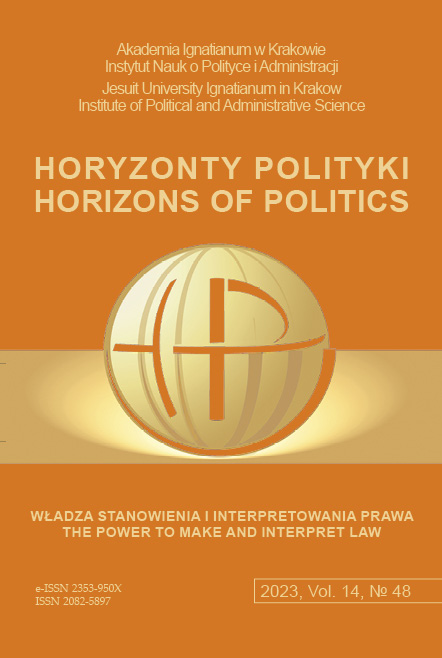Władza parlamentu do stanowienia i interpretowania prawa – kontrowersje wokół wykładni autentycznej ustaw
Parliament's Power to Make and Interpret the Law – the Controversy over Authentic Interpretation of Laws
Author(s): Małgorzata StefaniukSubject(s): Governance, Public Law, Politics and law
Published by: Uniwersytet Ignatianum w Krakowie
Keywords: authentic interpretation; legislative power; principle of separation of powers; principle of legalism; legal definitions
Summary/Abstract: RESEARCH OBJECTIVE: The article aims to present the controversy surrounding the right of the legislature to carry out authentic interpretation in a democratic state ruled by law and the validity of the constitutional principles of separation of powers and legalism. THE RESEARCH PROBLEM AND METHODS: The following questions are asked in this article: Are the arguments in support of the thesis that authentic interpretation is inadmissible on the ground that it is contrary to the principle of separation of powers and the principle of legality sufficiently convincing? Can the parliament interpret the law adopted by itself using other legal constructs? The article uses the method of analysis of the literature on the subject, court case-law and the legal-dogmatic analysis and comparative method. THE PROCESS OF ARGUMENTATION: The essence of authentic interpretation has been presented in order to move on to the authentic interpretation of laws. A critical analysis was made regarding the arguments proposed against the legitimacy of the functioning of authentic interpretation in a democratic state ruled by law. Legal constructions considered as forms of authentic interpretation of statutes are also presented. RESEARCH RESULTS: The arguments being raised nowadays that authentic interpretation is in opposition to the principles of separation of powers and legality are not convincing. It seems that legal definitions, preambles and explanatory memoranda to draft laws may appear as forms of authentic interpretation, although some Authors are in the opinion that these legal constructions should not be considered as ones. CONCLUSIONS, INNOVATIONS, AND RECOMMENDATIONS: The issue of authentic interpretation generates many interesting issues in terms of relations between the theory of law and the dogmatics of law or the theory of law and jurisprudence. Whether the legal definitions, preambles and legislative materials are forms of authentic interpretation depends on the adopted research assumptions.
Journal: Horyzonty Polityki
- Issue Year: 14/2023
- Issue No: 48
- Page Range: 15-35
- Page Count: 21
- Language: Polish

